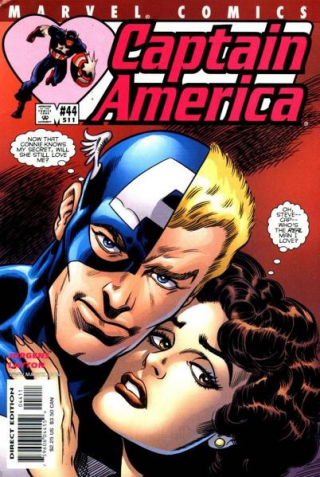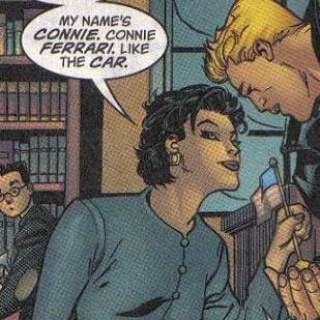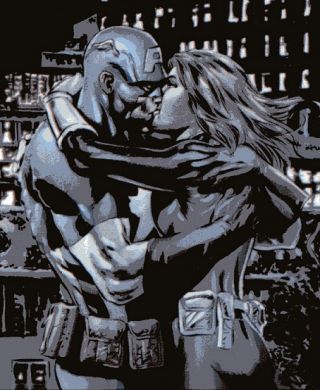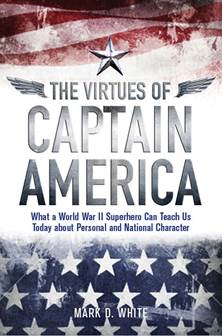Relationships
What Can We Learn About Love From Captain America?
When love must bow to duty—and when it doesn't.
Posted February 10, 2014

In the last fifty years of his modern appearances in Marvel Comics, one constant theme in Captain America’s stories has been sacrifice for the cause of duty. Cap’s willingness to place his duty above his own well-being and happiness is just one of his admirable qualities that I explore in my new book, The Virtues of Captain America: Modern-Day Lessons on Character from a World War II Supehero. And while he regularly risks life and limb to protect others, no sacrifice Captain America makes for the sake of duty is more poignant than love, the topic of this Valentine's Day post!
It is common for superheroes to forgo romantic relationships out of fear of putting people they care about in harm’s way, but no one takes this more seriously than Captain America, especially after the death of his sidekick Bucky during World War II. Even though SHIELD agent Sharon Carter (the niece of Cap’s 1940s love Peggy Carter) was actually first to reject a life with Cap for the sake of duty, Cap “returned the favor” in spades for years to come. Just several issues after his rejected proposal, Cap and Sharon were reunited. Falling into each other’s arms, Cap asked, “then—what of us? Can we even dare to hope—that there still may be—a life for us—together?” Sharon started to answer “We each have our duty—” but Cap interjected, asking, “Why is duty such a jealous master? Can it never share the heart with love?”(Captain America, vol. 1, #100, 1968).

Later, when Sharon tries to get Cap to quit, Cap responds with the groovy line, “This is my bag… I’ve got to stay in it!” (Captain America, vol. 1, #204, 1976). Sharon then questions Cap’s bravery: “You haven’t got the courage to choose between your uniform—and our happiness!” Cap answers, this time in the language of principle rather than duty, “It isn’t a matter of courage! The issue is dedication! Is it wrong to stick to a principle? My dedication to what I do is as strong as my love for you!” (Captain America, vol. 1, #206, 1977). To Cap, the issue was one of self-interest versus duty, and that decision is a simple one—it will be duty every time.
Sharon Carter appeared to die not long after that (Captain America, vol. 1, #233, 1979), another death of someone close to him that Cap carried with him until discovering she was alive many years later (Captain America, vol. 1, #445, 1995). While Sharon was “dead” (actually on a secret SHIELD mission), Steve was involved in a few significant relationships, most notably with glass-blower-turned-lawyer Bernie Rosenthal, a neighbor in Steve Rogers’ building. But Steve’s past continued to haunt him; as a narration box under a despondent Steve Rogers read, “since Sharon’s death, he’s been understandably reticent about matters of the heart” (Marvel Team-Up #128, 1983). This reticence stopped him from opening up to Bernie (and later love interests as well). (See Captain America, vol. 1, #270, 1982, for a poignant scene in which Bernie struggles with loving a man who she isn’t sure loves her back—though, by the end of the issue, there can no doubt regarding Steve’s feelings.)

When Bernie proposes to Steve (after she learned about his dual identity), she mocked his fear of the horrible risk he would be imposing on her:
You can stop right there! I know the whole routine! Don’t you think I read comic books when I was a kid? “Oh darling,” the hero would sigh, “I cannot marry you for fear of what my arch-enemy, Hairless Harry, might do to you if he found out!” I didn’t buy it then, and I don’t buy it now! It’s bull! (Captain America, vol. 1, #294, 1984)
She explained that every marriage involves risk and then she shamed him into taking this one: “Why don’t you do what you do best: Be a hero. Marry me.”
Steve accepted, but our lovely couple would not live “happily ever after.” Steve had worries even before the proposal, and not merely after Bernie’s safety. He thought to himself, “She grounds me. Just being with her makes me believe Steve Rogers can exist without Captain America. And perhaps that’s what’s really scaring me” (Captain America, vol. 1, #286, 1983). As much as he lamented the fact that he cannot live separate lives, to some extent he was afraid of what that would mean for him in both of his identities and roles, even if only because being Steve Rogers for once would be new and unexplored territory. Ironically, Bernie is the one to break off the engagement and the relationship, enrolling in law school in Wisconsin for fear of getting too wrapped up in Cap’s life. It turned out that she feared losing her sense of self in Captain America just as much as Steve did!

His relationship with Bernie wasn’t the last one to be doomed because of issues with his overwhelming sense of duty and issues with his identity. Connie Ferrari, another lawyer, couldn’t deal with his secrecy and the fact that “your job as Captain America is what comes first.” During their break-up, she asked him one question before declaring their relationship over for good: “When you think of yourself, your daily life, who are and what you do… do you picture yourself as Steve Rogers or Captain America?” (Captain America, vol. 3, #49, 2002). You can guess the answer, and that spelled the end of that relationship.
Our story isn’t over, though! His last words with Connie, together with an earlier chat with Sam Wilson (otherwise known as the Falcon) while on a fishing trip, resulted in an epiphany for Steve. He rushed to find Sharon (remember her?) and told her:
I was wrong. Trying to be two people when I’m only one. It’s almost like I tried to maintain two lives to such a degree—that I thought Cap needed one relationship while Steve Rogers needed another. I couldn’t be more stupid. (Captain America, vol. 3, #49, 2002).
In the next issue, he submitted to a SHIELD truth serum to reveal to her that “it’s not like there’s two of me. There’s just… me. Powerful as this symbol is… it’s a uniform. Beneath it—I’m still the same man.” (Captain America, vol. 3, #50, 2002).

For Captain America, love represents a constant struggle between following his duty and pursuing happiness. Many of us, I'm sure, have been in this same position, whether the duty is to family, to work, or even to ourselves in the form of a promise to earn a degree, get a certain job, or land a promotion. But we can learn from Cap's romantic mishaps: not only can duty and love be reconciled, but they must be! You're always going to have duties and responsibilities to others, but you also have a duty to yourself: to live a life balancing responsibility and happiness, including love (if you so choose).
You'll be happy to know that, after reconnecting a decade ago, Captain America and Sharon Carter were a solid couple until... well, I won't spoil it for you. (Read here if you really want to know.) It took him a while, but Cap eventually found a way to continue protecting the people of America and the world while also allowing himself to enjoy love and be happy. And if Captain America can find that balance in his life, I think we stand a good chance of finding it too—and you don't need super-soldier serum or a near-indestructible shield to do that!
----------

This post was adapted from my book The Virtues of Captain America: Modern-Day Lessons on Character from a World War II Supehero, available now from Wiley Blackwell. For more information on the book, see the page for it at my personal blog, which includes links to the introduction and first chapter as well as other articles and blog posts I have written on the topic (including here at Psychology Today).
And for more superhero Valentine's Day goodness, see my posts at The Comics Professor on the romantic escapades of Thor and the Fantastic Four.
And as always, I invite you to follow me on Twitter, visit me at my website, and sample my other blogs: Economics and Ethics and The Comics Professor.




